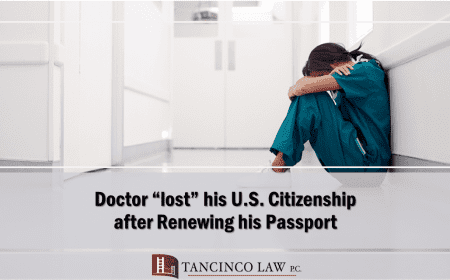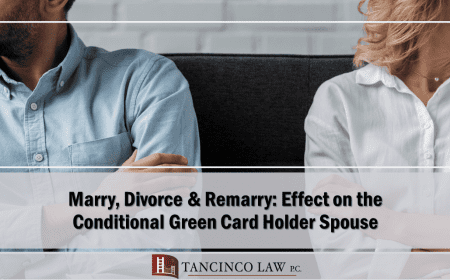Three months after arriving in the US, Laura married her US citizen fiancé Mark. The couple had a harmonious relationship but Mark’s behavior changed a few weeks after the marriage. It started when Laura insisted on having the petition for immigrant visa filed on her behalf. Mark began processing the documents but did not file these with the immigration service. Instead, Mark had used this process to seek more sexual favors from her spouse Laura.
Despite the fact that they were married, Laura resented what Mark is compelling her to do. She had informed her counsel that Mark had been asking her to do some acts which are against her will. Whenever she refused, she was beaten and threatened with deportation. Laura could no longer stand being with Mark and left their marital home.
Mark informed the US Department of Homeland Security about the expired visa of Laura. The Immigration and Customs Enforcement (ICE) agents took Laura into custody from the temporary home of a friend where she sought refuge. Laura was released on bail and is now facing deportation proceedings. During the hearing, she claimed that she was a victim of domestic violence and is now seeking relief under the Violence Against Women Act (VAWA). She was told that she could self petition as an abused spouse. What are the chances of Laura getting a dismissal of her deportation/removal proceedings? Will she be able to obtain her own green card?
Relief for Victims
The Immigration and Nationality Act (INA) allows a victim of domestic violence to obtain legal status in the US through self petitioning. A victim of domestic violence may self petition for green card without the help of the abusive spouse. The victim should be the spouse of a US citizen or a green card holder.
In the Filipino community, there are several cases of domestic violence. Very few who have come out to report the abuses are very courageous and are willing to face their abusers in courts. There are also cases of Filipina women who are so afraid to report the matter for fear that they will be deported. With the “self petitioning” provisions of INA, there is no need for the abusive US citizen spouse to cooperate in the immigration process.
Victims of domestic violence who may avail of this self petition may also be non US citizen children who were subjected to extreme cruelty by their US citizen or permanent resident parent .
To be eligible to self petition the victim must be able to show (1) that she is qualified to be an immediate relative of a US citizen or second preference family sponsored immigration. There must be proof of the abuser’s US citizenship or permanent resident status; (2) if the victim is a spouse, he must show that there was a good faith marriage even subsequently their marriage was dissolved or that they are no longer living together as husband and wife;(3) evidence of battery or extreme cruelty and (4) proof that the victim resided with the abuser in the past; (5) proof of good moral character of the victim.
Not Merely a Bad Marriage
In determining whether the self petitioner is indeed a victim of domestic violence, the examining officer will have to look through all the evidence that constitutes “battery or cruelty” by the US citizen spouse or parent.
Pertinent regulations note that these acts are not limited to actual acts or threatened acts of violence. Cruelty does not necessarily entail physical violence; it could be emotional or mental cruelty which may form part of the overall pattern of violence.
In interviewing victims of domestic violence on their self petitions, several questions may be asked to determine whether the abuser’s behavior and alleged acts of violence may be characterized as abusive under the law or merely acts simply indicative of a bad marriage.
To draw the line of distinction between a bad marriage and abused cases requires substantial evidence. Substantial evidence does not mean voluminous evidence but rather convincing evidence that may be presented during the interview. This may include reports and affidavits of police, medical personnel, school officials, clergy, social workers and other social service agency personnel.
In non-physical abuses, the burden may be difficult to prove. It is always recommended that the self petitioner works with a domestic violence counselor to assist in gathering evidence necessary for the application. Details of the incidents of abuse are usually corroborated by domestic violence counselor or shelter workers whose expertise is to identify what actually constitutes domestic violence.
Self Petitioner’s Residency Requirements
Filing for self petition requires that the victim resided with the abuser in the past. This is in addition to proving the good faith relationship. There are those who decided not just to leave the abuser but also to depart for the Philippines after experiencing traumatic experiences from their US citizen spouse or parent.
The residency requirement may still be met even if the self petitioner is outside the United States. In this situation, it is required that the victim resided in the US with the abusive spouse. If the victim and the abuser are living outside the US, a self petition may be filed as long as the abuser is employed by the US government or military and the domestic violence occurred in the United States.
Sure, there are the actions by a spouse that may truly be an indication of a bad marriage. However, one does not have to wait until the threat of violence occurs before their action turns to a criminal act. The immigrant victim is afforded immigration benefits more liberal than in ordinary spousal petitions. Domestic violence of any kind is not tolerated and the law exists to protect the victims.
(Tancinco may be reached at law@tancinco.com or at 887 7177)




